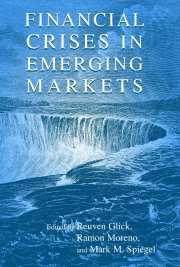Book contents
- Frontmatter
- Contents
- Preface
- Contributors
- 1 Financial Crises in Emerging Markets: An Introductory Overview
- PART I DETERMINANTS AND PROPAGATION OF FINANCIAL CRISES
- PART II CAPITAL FLOWS AND REVERSALS
- 5 Uncertainty and the Disappearance of International Credit
- Discussion
- 6 International Capital Inflows, Domestic Financial Intermediation, and Financial Crises under Imperfect Information
- Discussion
- 7 Private Inflows when Crises Are Anticipated: A Case Study of Korea
- Discussion
- PART III INSTITUTIONAL FACTORS AND FINANCIAL STRUCTURE
- PART IV POLICY RESPONSES
- Index
6 - International Capital Inflows, Domestic Financial Intermediation, and Financial Crises under Imperfect Information
Published online by Cambridge University Press: 04 August 2010
- Frontmatter
- Contents
- Preface
- Contributors
- 1 Financial Crises in Emerging Markets: An Introductory Overview
- PART I DETERMINANTS AND PROPAGATION OF FINANCIAL CRISES
- PART II CAPITAL FLOWS AND REVERSALS
- 5 Uncertainty and the Disappearance of International Credit
- Discussion
- 6 International Capital Inflows, Domestic Financial Intermediation, and Financial Crises under Imperfect Information
- Discussion
- 7 Private Inflows when Crises Are Anticipated: A Case Study of Korea
- Discussion
- PART III INSTITUTIONAL FACTORS AND FINANCIAL STRUCTURE
- PART IV POLICY RESPONSES
- Index
Summary
INTRODUCTION
Recent financial crises in emerging markets have been preceded by periods of large capital inflows and expansions of the domestic banking sector. In the aftermath of these crises, economic growth has fallen sharply and, in some cases, has been slow to recover. Many of the recent crises have been associated with implicit guarantees by sovereign governments of foreign currency debts accumulated by the private sector. Recently several economists, notably Calvo (1998a), have observed that these crises evolve through complicated interactions between domestic financial sectors, international lenders, and national governments. Financial crises have often been characterized by concurrent banking and currency crises. Recent experience suggests that banking crises are not necessarily just an outcome of a collapsing exchange rate regime. Instead, the source of a financial crisis may be found in the interaction between the microeconomics of private financial intermediation and government macroeconomic policies.
In this chapter we propose a theoretical model of the dynamics of bank lending, domestic production, and the accumulation of foreign currency liabilities by domestic financial intermediaries that ultimately leads to a financial crisis. These dynamics derive from the introduction of an agency problem in domestic financial intermediation that originates in an informational advantage for domestic banks in domestic lending and government provision of insurance to private financial activities. The equilibrium for the model economy predicts twin banking and currency crises that end a period of high gross domestic output growth and inflows of foreign capital.
- Type
- Chapter
- Information
- Financial Crises in Emerging Markets , pp. 196 - 237Publisher: Cambridge University PressPrint publication year: 2001
- 10
- Cited by



